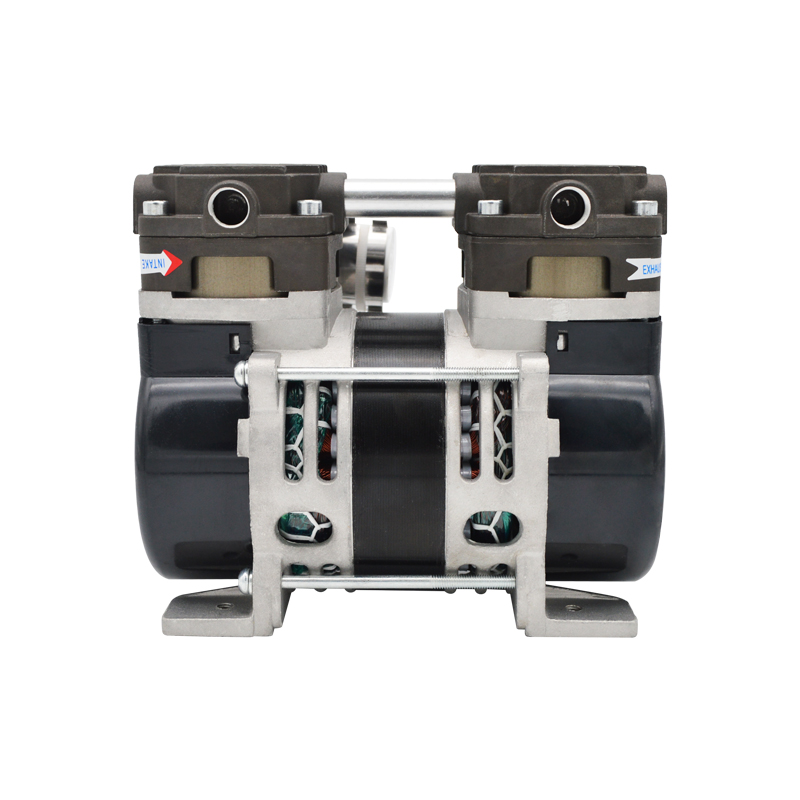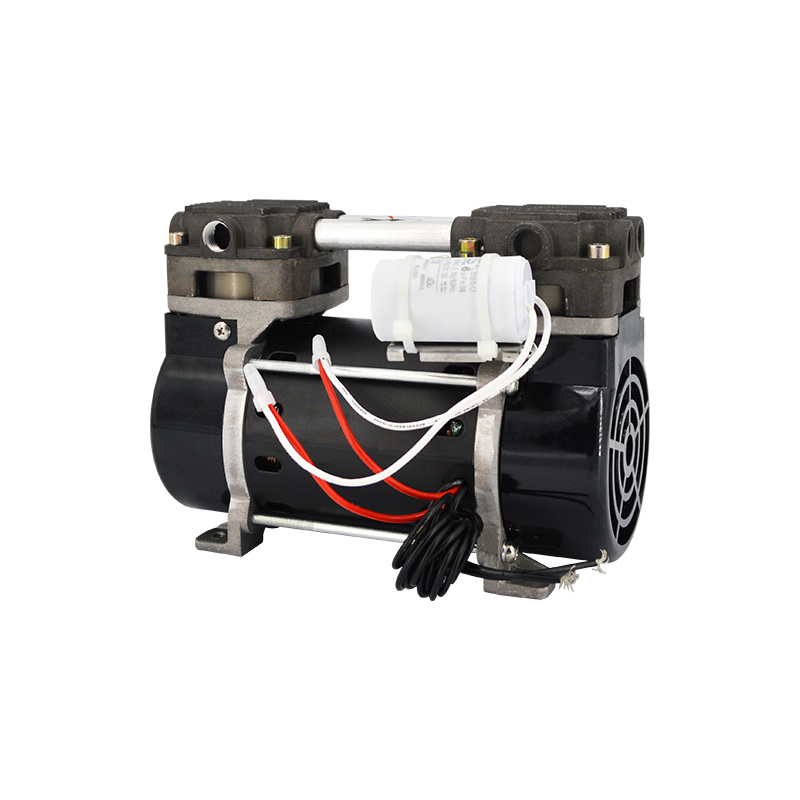Oil free air compressor is a driven fluid machinery that promotes low-pressure gas into high-pressure gas. It is the engine of air source system. In the application, it is inevitable to encounter various problems, which seriously affect the work. In order to make it convenient for us to find the cause and repair it in time when we have problems, the following summarizes five common types of problems and their cause analysis according to our experience in the repair of oil-free air compressor.
1、 Insufficient exhaust
Insufficient exhaust volume is a simple problem of the compressor, which is mainly caused by the following reasons:
1. Fault of air inlet filter: dirt is blocked, which reduces the exhaust volume; The suction pipe is too long and the pipe diameter is too small, which increases the suction resistance and affects the air volume. The filter should be cleaned regularly.
2. The decrease of compressor speed will reduce the exhaust volume: the air compressor is not used properly, because the exhaust volume of the air compressor is planned according to a certain altitude, suction temperature and humidity. When it is used on a plateau exceeding the above specifications, the suction pressure will decrease, and the exhaust volume will decrease.
3 the cylinder, piston and piston ring are severely worn and out of tolerance, which increases the relevant gap and leakage, affecting the exhaust volume. In case of normal wear, vulnerable parts, such as piston rings, shall be replaced in time. If the device is incorrect and the gap is not properly reserved, it shall be corrected according to the drawing. If there is no drawing, experience data can be taken. For the gap between the piston and the cylinder along the circumference, if it is a cast iron piston, the gap value is 0.06/100 ~ 0.09/100 of the cylinder diameter; For the aluminum alloy piston, the gap is 0.12/100 ~ 0.18/100 of the gas diameter; Steel piston can take the smaller value of aluminum alloy piston.
4. The stuffing box is not tight, resulting in air leakage and reducing the air volume. The reason is that the stuffing box itself does not meet the requirements; Secondly, it may be due to the poor alignment between the piston rod and the center of the stuffing box during the installation, resulting in wear, strain and air leakage; Generally, the stuffing box is filled with smooth oil, which can have the effect of smoothness, sealing and cooling.
5. The influence of the suction and exhaust valves of the compressor on the exhaust volume. Metal fragments or other sundries fall between the valve seat and valve plate of the air valve, resulting in loose closing and air leakage. This not only affects the exhaust volume, but also affects the changes of interstage pressure and temperature; The appearance of this problem may cause air leakage due to the production quality problems, such as valve warpage, and the severe wear of valve seat and valve plate.
6. The tension spring force of the air valve is not well matched with the gas force. If the elasticity is too strong, the valve plate will open slowly. If the elasticity is too weak, the valve plate will not be closed in time. These will not only affect the gas volume, but also affect the addition of power and the service life of the gas valve plate and tension spring. Together, it will also affect the changes of gas pressure and temperature.
7. The pressure of the compressed air valve is improper. If the pressing force is small, there will be air leakage. Of course, if it is too tight, the valve cover will be deformed and damaged. If there is something wrong with the air valve, the valve cover must be hot and the pressure together is not normal.
2、 Abnormal pressure
If the air volume discharged by the compressor cannot meet the flow requirements of the user under additional pressure, the exhaust pressure must be reduced. At this moment, we have to change a machine with the same exhaust pressure and large exhaust volume. The primary reason affecting the abnormal interstage pressure is the air leakage of the air valve or the air leakage after the wear of the piston ring, so we should find the reasons and take measures from these aspects.
3、 Abnormal temperature
Abnormal exhaust temperature means that it is higher than the planned value. From the theoretical progress, the factors affecting the increase of exhaust temperature are: inlet temperature, pressure ratio and tightening index. The actual situation affects the elements with high suction temperature, such as low central cooling power, or more scale in the intercooler may affect the heat exchange, the suction temperature of the later stage must be high, and the interstage pressure will also change. As long as the pressure ratio is higher than the normal value, the exhaust temperature will increase. In addition, water-cooled machines, lack of water or insufficient water will increase the exhaust temperature.
4、 Abnormal sound
If some parts of the compressor are defective, it will announce an abnormal sound. Generally speaking, the operator can distinguish the abnormal sound. The gap between the piston and the cylinder head is too small, resulting in direct impact; The connecting nut between the piston rod and the piston is loose or out of mouth; The end face of the piston is plugged, and the piston moves upward in series to collide with the cylinder head; Metal fragments falling into the cylinder and water accumulation in the cylinder can announce the knocking sound in the cylinder. The crankshaft bearing bush bolts, nuts, connecting rod bolts and crosshead bolts in the crankcase are loose, tripped and broken, the shaft diameter is severely worn, the gap is increased, and the cooperation gap between crosshead pin and bushing is too large or severely worn, which can announce the impact sound in the crankcase. The knocking sound can be announced in the valve cavity if the exhaust valve disc is broken, the valve tension spring is soft or damaged, the load regulator is improperly adjusted, etc. So we can find problems and take measures.
5、 Overheat problem
When the temperature exceeds the specified value at the conflict between crankshaft and bearing, crosshead and sliding plate, packing and rod, it is called overheating. The consequences of overheating: one is to accelerate the wear between friction pairs, and the other is the continuous accumulation of excessive heat energy, which will directly burn the friction surface and form a serious accident of the machine. The main reasons for bearing overheating are: uneven fit between bearing and journal or too small contact area; The bearing is skewed, the crankshaft is bent and smooth, the oil viscosity is too small, the oil circuit is blocked, and the oil pump is faulty, resulting in oil interruption, etc; The device is not leveled, the gap is not found, the main shaft and motor shaft are not aligned, and the two shafts are inclined.
Through the understanding of the problems of the compressor, we can deal with the problems in time and reduce the losses. Of course, these are only common problems. If you encounter problems that cannot be handled in the maintenance of oil-free air compressor, you can replace them or send them to repair.
 English
English  Español
Español  Português
Português  русский
русский  Français
Français  日本語
日本語  Deutsch
Deutsch  tiếng Việt
tiếng Việt  Italiano
Italiano  Nederlands
Nederlands  ภาษาไทย
ภาษาไทย  Polski
Polski  한국어
한국어  Svenska
Svenska  magyar
magyar  Malay
Malay  বাংলা ভাষার
বাংলা ভাষার  Dansk
Dansk  Suomi
Suomi  हिन्दी
हिन्दी  Pilipino
Pilipino  Türkçe
Türkçe  Gaeilge
Gaeilge  العربية
العربية  Indonesia
Indonesia  Norsk
Norsk  تمل
تمل  český
český  ελληνικά
ελληνικά  український
український  Javanese
Javanese  فارسی
فارسی  தமிழ்
தமிழ்  తెలుగు
తెలుగు  नेपाली
नेपाली  Burmese
Burmese  български
български  ລາວ
ລາວ  Latine
Latine  Қазақша
Қазақша  Euskal
Euskal  Azərbaycan
Azərbaycan  Slovenský jazyk
Slovenský jazyk  Македонски
Македонски  Lietuvos
Lietuvos  Eesti Keel
Eesti Keel  Română
Română  Slovenski
Slovenski  मराठी
मराठी  Srpski језик
Srpski језик 




